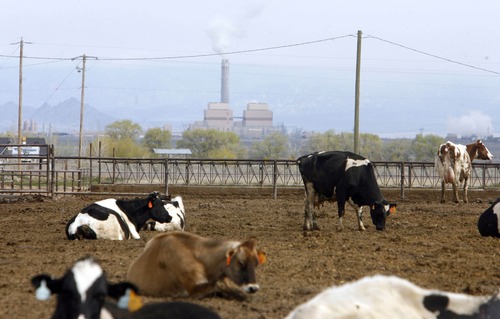This is an archived article that was published on sltrib.com in 2013, and information in the article may be outdated. It is provided only for personal research purposes and may not be reprinted.
Utah dairy farmers have fought for nearly a decade against the Intermountain Power Plant near Delta over claims that stray electricity from power lines is sickening and killing their cows.
Just as their lawyers began to hope the lengthy legal battle could come to trial before the end of the year, a new obstacle has emerged that could end the lawsuit before it reaches a jury.
Senate Bill 217, introduced at the Utah Legislature earlier this week by Sen. Todd Weiler, R-Woods Cross, is designed to protect power producers such as IPP from having to pay damages to livestock owners.
Electricity generators would only be liable for damages if stray voltage that wanders off their power lines and into the ground around their plants exceeds the level that the Utah dairy farms near Delta contend is harming their animals.
"This bill directly targets our pending lawsuit," said Jeff Gross, a Utah attorney who is helping to represent 18 dairy farmers in their suit against the power producer.
The legislation, Gross, noted, specifically exempts utilities such as IPP from liability in legal actions already pending.
Weiler conceded he agreed to sponsor the bill after being contacted by representatives from IPP and "other utilities."
The first-term senator and attorney said the bill, introduced in the Utah Senate Thursday, will "serve the greater public good" by protecting electricity producers from frivolous lawsuits that could increase the power bills of homeowners and businesses.
"The fact of the matter is that you can't produce and deliver electricity without having some spillage," Weiler said.
Well over a decade ago, dairy farmers operating near the IPP near Delta began to complain that inordinate numbers of cows in their herds were getting sick and dying of ailments that should have been treatable. They came to believe that electrical currents surging through the ground from the nearby-coal fired power plant and its transmission lines were compromising their cows' immune systems.
The Utah dairy farmers, along with several California dairy operators whose farm operations were located at the end of an IPP power transmission line, filed a lawsuit in 2003 in the Superior Court of California in Los Angeles against the Intermountain Power Agency, the IPP's operator.
Subsequent legal maneuvering resulted in the case dragging on for almost 10 years. Those legal maneuvers include two requests for a change of venue by the power plant operators and one by the dairy farmers.
IPP also tried unsuccessfully to disqualify the dairy owners' expert witness from testifying on stray voltage and the harm it can cause to animals.
IPP adamantly disputes the claims against it, saying its own experts have looked into the dairy farmers' contentions and found that no harm is being done to their herds.
Weiler said IPP has been forced to spend hundreds of thousands of dollars defending against the allegations, even though the level of electricity in question is "lower than the level you would get rubbing your feet on the carpet and touching someone."
Dairy farmers Maria and John Nye believe that SB 217 is only the latest move by IPP to dodge a legal hearing, calling it a "thinly veiled attempt" to avoid justice and evidence the dairy farmers' case is strong.
"We've had to jump through so many hoops," Maria Nye said. "And now that we are close to getting a trial date, this comes up."



